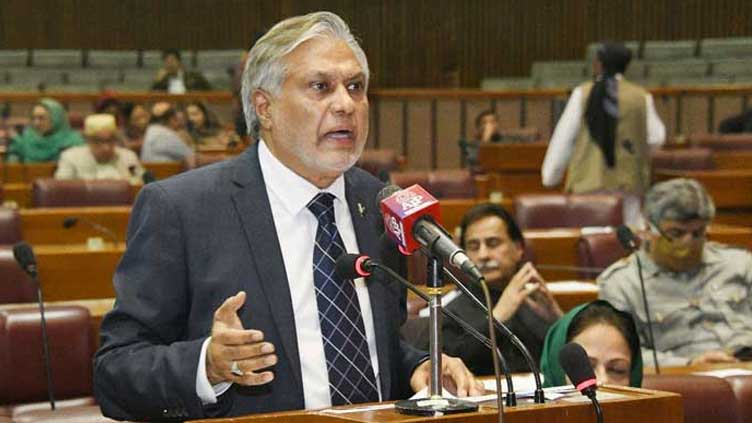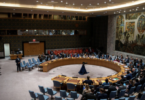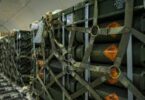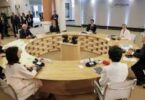ISLAMABAD (APP): Minister for Finance and Revenue Muhammad Ishaq Dar on Friday unveiled the Rs14.46 trillion relief-oriented Federal Budget for the fiscal year 2023-24 with real GDP growth target of 3.5 percent
Presenting the Federal Budget 2023-24 in the National Assembly, the finance minister said although the government had set the direction of the economy on right path, it was still facing challenges. However, keeping in view the economic scenario, it had set the modest growth target and despite being the election year, presented a responsible and balanced budget and not a popular one. The total expenses’ estimate, he said, was set at Rs 14.46 trillion, out of which Rs 7.3 trillion would be spent on interest payment. The budget deficit was expected to remain 6.54 percent and the primary balance would be a surplus of 0.4 percent to the gross domestic product (GDP).
The minister said the tax collection target of the Federal Board of Revenue (FBR) for the next fiscal year had been fixed at Rs 9.2 trillion, including provincial share of Rs 5.276 trillion. The federal non-tax revenues, he added, would be Rs 2.963 trillion while total income of the Federal Government would be Rs 6.887 billion.
Ishaq Dar said an amount of Rs 950 billion was being allocated for the development projects under the Public Sector Development Programme (PSDP) 2023-24. Moreover, an additional amount of Rs 200 billion would also be part of the development budget that would be managed through public-private partnership, he added. He said for the country’s defence and civil administration, Rs 1.8 trillion and Rs 714 billion would be provided respectively whereas Rs 761 billion had been allocated for the payments of employees’ pensions. Ishaq Dar said the government had estimated an expenditure of Rs 1.074 trillion for the provision of subsidies in electricity, gas and other sectors.
The finance minister said a grant of Rs 1.464 trillion had been earmarked for Azad Jammu & Kashmir, merged tribal districts of Khyber Pakhtunkhwa, Higher Education Commission, Benazir Income Support Programme (BISP), Railways and other sectors. To boost the agriculture production in the country, he said the agriculture credit for the upcoming fiscal year was being increased from Rs 1.8 trillion to Rs 2.25 trillion, besides earmarking Rs 30 billion to switch 50,000 tubewells to solar energy. The other measures for the agriculture included exemption of all taxes and duties on import of quality seeds and saplings, combined harvesters, rice planters, seeders and dryers; allocation of Rs 5 billion to provide concessional loans to agro industry; and five years tax exemption for agro-based industrial units with annual turnover of Rs 800 million, he added. Similarly, Ishaq Dar said, under the PM’s Youth Business and Agriculture Loan Scheme the government would provide Rs 10 billion as subsidy.
In a bid to boost IT (information technology) exports, the minister said 0.25% concessional rate of income tax would remain intact until June 30, 2026. Moreover, the freelancers earning up to $24,000 per year would also be exempted from sales tax registration and filing tax returns while a singe page income tax return would be introduced for them, he added. He said the IT and IT enabled service providers would be allowed to import duty free software and hardware valuing one percent of their total export proceeds. The upper limit of the exports had been set at $50,000 per year.
He said the IT sector was being given the status of industry which would help it availing concessional income tax rates. Likewise, he said, the government was establishing a venture capital fund with seed money of Rs 5 billion to provide business resources to the IT entrepreneurs. The government had also reduced the sales tax rate from 15% to 5% for IT services in the Islamabad Capital Territory, he added. The minister said during the upcoming financial year, the government would provide professional training to 50,000 IT graduates.
Highlighting the relief measures proposed for the Small and Medium Enterprises (SMEs) sector, the finance minister said the turnover threshold under the tax facilitation system for the SMEs was being expanded from Rs 250 million to Rs 800 million while under the PM’s Youth Loan Programme, the government had earmarked Rs 10 billion to provide concessional loans for small businesses. For the industry and export sector, he said the government would establish Export Council of Pakistan under the chairmanship of the prime minister which would meet every quarter to make decisions about the sector. Other relief measures for the sector included reduction of minimum tax for all the listed companies from 1.25% to 1%, withdrawal of 5% regulatory duty on synthetic filament yarn which was not manufactured locally, reduction of customs duty on pet scrap from 20% to 11%, and exemption of customs duty for manufacturers of rice mill machinery and machine tools, he added. Ishaq Dar also announced relief measures for the overseas Pakistanis, which included withdrawal of 2% final tax on purchase of immovable property through foreign remittances.
Similarly, he also announced the issuance of Diamond Cards to the overseas Pakistanis sending remittances of over $50,000 per year. The Diamond Card holders would avail various facilities including non-prohibited bore licenses, gratis passports, preferential aces to Pakistani embassies and consulates, fast track immigration facility at Pakistani airports, and provision of handsome prize money through lucky draws. Highlighting the measures taken for the education sector, Ishaq Dar said the government had earmarked Rs 65 billion for current expenditure and Rs 70 billion for development expenditure.
The government, he said, was also establishing the Pakistan Endowment Fund under which an amount of Rs 5 billion had been earmarked in the budget to provide merit scholarships to the high school and college students. He said the Federal Government would distribute 100,000 laptops among deserving and the most talented students for which an amount of Rs 10 billion was being set aside. Similarly, he said, the government was also allocating Rs 5 billion to promote sport activities in schools and colleges. He said the government had earmarked Rs 5 billion for women empowerment under which concessional loans for businesses would be provided, besides projects of skill development and training for running business would be initiated.
Under the Prime Minister’s Youth Programme for Small Loans, he said the government had allocated Rs 10 billion to provide loans on concessional rates for opening new businesses. The minister said to promote the construction sector and facilitate common man for building new houses, a tax exemption of 10% or Rs 5 million (whichever is lower) would be given on business income of the construction enterprises and the people intended to build new houses would be given concession of Rs 1 million or 10% tax credit (whichever is lower) for next three years.
He said the government had increased the budget of Benazir Income Support Programme (BISP) to Rs 360 billion which was being enhanced by another Rs 40 billion for the upcoming fiscal year. In the fiscal year 2023-24, as many as 9.3 million families would receive Rs 8,750 each per quarter for which an amount of Rs 346 billion had been earmarked, he added. With respect to the PSDP 2023-24, the minister said 80% projects were near completion and expected to be completed by the end of 2024. “In order to attract Foreign Direct Investment and to provide state of the art infrastructure the government has allocated 52% share of the total PSDP outlay,” he added.
The minister said the government had planned to issue the Working Journalist Health Insurance Card and Artist Health Insurance Card during the year 2023-24. Announcing relief measures for the salaried class, Ishaq Dar said the government had proposed 30-35 percent increase in the salaries on ad-hoc basis and 17.5 percent enhancement in the pensions of the Federal Government employees, realizing their financial hardships due to the increased inflation. The minister said the government had decided to give 35 percent ad-hoc relief in the salaries of employees from Grade1-16 and 30 percent to Grade-17-22 employees aimed at increasing their purchase power.
He also announced increasing the minimum pension fixing it at Rs 12,000 and minimum monthly wage from Rs 25,000 to Rs 32,000 within the Islamabad Capital Territory (ICT). The minister said there was a proposal to enhance the pension of Employees’ Old-Age Benefits Institution (EOBI) from Rs 8,500 to Rs10,000. Ishaq Dar said the government was going to introduce a scheme under which it would itself pay up to Rs 1 million loans of the Housing Building Finance Corporation (HBFC) owned by the widows of government employees. The minister said the deposit limit of CDNS (Central Directorate of National Savings) Shuhada Account and Behbood Saving Certificates would be increased from Rs 5 million to Rs 7.5 million.
He said out of a total Rs 1,150 billion Federal PSDP, the government allocated Rs 652.949 billion for federal ministries, Rs 212.050 billion for corporations, including National Highway Authority (Rs 157.500 billion) and PEPCO (Rs54.440 billion), and Rs 200 billion for VGF for Public Private Partnership (PPP) projects. The government, he said, also proposed an allocation of Rs 107.500 billion for the Water Resources Division, Rs 5.450 billion for the Aviation Division, Rs 1,114 million for the Board of Investment, Rs 90.120 billion for the Cabinet Division, Rs 4.050 billion for Climate the Change Division, Rs1.100 billion for the Commerce Division, Rs 360.390 million for the Communication Division (other than NHA), Rs 3.400 billion for the Defence Division, and Rs 2 billion for the Defence Production Division.
Solar products exempted from custom duty
ISLAMABAD (APP): Minister for Finance and Revenue, Senator Ishaq Dar on Friday announced the exemption of customs duty on the raw material used in the production of solar energy products.
“This exemption encompasses essential components such as inverters, solar panels, and batteries, marking a positive step towards promoting renewable energy in the country,” the minister said while announcing the federal budget for the fiscal year 2023-24.
Dar emphasized that Pakistan’s energy requirements were being met through costly imported items, leading to a surge in inflation. He highlighted the country’s dependence on these expensive imports as a significant factor contributing to the rising costs and economic challenges faced by the nation.
IT sector to become engine of growth in coming years
ISLAMABAD (APP): Finance Minister Ishaq Dar on Friday announce that Information Technology and IT-enabled service providers will be allowed to import software and hardware equal to one percent of their exports without any tax.
Presenting the Federal Budget for the fiscal year 2023-24 on the floor of the National Assembly, he said the limit of these imports will be $50,000 dollars annually. He said it will be ensured to automated exemption certificates for the exporters of IT and IT services.
He expressed the confidence that the IT sector will prove to be an engine of growth in the coming years. He said that at present, concessional 0.25 percent income tax is in place for promotion of IT exports and the same facility will be continued till June 2026, 30 June.
35% increase in salaries, 17.5% in pensions
ISLAMABAD (APP): Minister for Finance and Revenue Senator Mohammad Ishaq Dar on Friday proposed 30-35 percent increase in the salaries on ad-hoc basis and 17.5 percent enhancement in the pensions of the Federal Government employees, realizing their financial hardships due to the increased inflation. Presenting the Federal Budget for the fiscal year 2023-24, the minister said the government had decided to give 35 percent ad-hoc relief in the salaries of employees from Grade1-16 and 30 percent to Grade-17-22 employees aimed at increasing their purchase power.
He also announced increasing the minimum pension fixing it at Rs 12,000 and minimum monthly wage from Rs 25,000 to Rs 32,000 within the Islamabad Capital Territory (ICT).
Govt earmarks Rs10b for youth small loans
ISLAMABAD (APP): Minister for Finance and Revenue Senator Mohammad Ishaq Dar on Friday announced that the government has earmarked Rs10 billion under Prime Minister Youth Programme (PMYP) for provision of small loans to the youth to establish their businesses in the Federal Budget 2023-24.
The Finance Minister made these remarks while presenting the Federal Budget 2023-24 here at the National Assembly. He said the government has allocated Rs 5 billion under Prime Minister Youth Skills Programme (PMYSP) to impart specialized training to make skilled and trained human resource. Senator Dar said it was the foremost priority of the incumbent government to empower the youth financially as they were future leaders.
Govt allocates Rs107b in energy sector
ISLAMABAD (APP): The Federal Government has allocated Rs107 billion for power production, distribution and transmission in the budget 2023-24.
Minister for Finance Ishaq Dar told the National Assembly on Friday that the power production capacity has risen to 41,000 megawatts out of which 25 per cent is generated through hydropower. the minister stressed the use of renewable energy to reduce national imports and reduce the cost of production.
He said improvement in distribution system, renewable energy and the use of water resources have been given special emphasis in PSDP. He said the government will provide Rs12 billion for the completion of the Jamshoro coal power plant in the next fiscal year which will produce 1,200 megawatts of electricity.
Regulatory duty 10% on import of used clothes repealed
ISLAMABAD (APP): Finance Minister Ishaq Dar on Friday said the government had decided to repeal the regulatory duty of 10 % on import of second-hand clothing to facilitate lower-income segment of the society.
Delivering the budget 2023-24 speech, he said usually the lower-income class buys secondhand clothing, hoping that the proposed repeal would facilitate them. Dar also announced launching of micro deposit scheme for low income people under the National Savings on 1st July.
This scheme would offer relatively higher profit ratio and the leverage to open an account digitally, he added. Informing about another initiative to be taken to facilitate people with lower income, the minister said only 1% sales tax would be imposed on Unani (homeopathic) medicine so that the rural and lower income population might not be affected.







